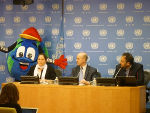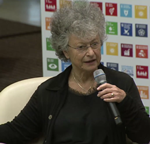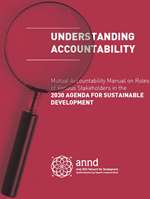Social Watch news
Published on Thu, 2016-05-05 00:00
The Panama Papers have helped expose how politicians, criminals and corporations around the world hide their cash and avoid taxes. In Papua New Guinea (PNG), foreign owned logging companies are profiteering, using some of the same tricks.
Recent research by the Oakland Institute revealed that most logging companies operating in the country are not paying corporate tax. Despite decades of operations and the country being today the largest exporter of tropical timber in the world, logging companies barely declare any profit. This deprives PNG of hundreds of millions of dollars in much needed revenue.
|
Published on Fri, 2016-04-29 11:21
While all human rights are indivisible, economic and social rights entail specific principles that bear relevance for tax policy. Economic and social rights require that states devote maximum available resources to their progressive realization. The principle of non-retrogression sets forth that states should not take measures that deliberately lead to retrogression on the enjoyment of such rights. States also have an immediate obligation to ensure the satisfaction of, at the very least, minimum essential levels of economic, social and cultural rights.
|
Published on Wed, 2016-04-27 11:27
Aldo Caliari, Director of the Rethinking Bretton Woods Project at the Center of Concern, reports on the outcomes of the first ECOSOC Financing for Development Forum that took place April 18 to 20, 2016 in New York. The Forum was intended to be the centerpiece of a reinvigorated follow up to the Financing for Development process created by the Third Financing for Development Conference held in Addis Ababa in 2015. "[...] those observing the first event to follow up on [2015's] commitments were suddenly awakened to the bitter reality of transitioning from paper to the realities of implementation."
|
Published on Tue, 2016-04-26 10:54
During the debate on “achieving the Sustainable Development Goals” held in the framework of the ECOSOC Meeting at the UN, Barbara Adams from Global Policy Forum and Social Watch said that we are having a situation where governments on one hand singed a climate change agreement and on the other hand are pushed by bilateral investment treaties that are obstacles in many cases to be able to achieve the Sustainable Development Goals.
|
Published on Fri, 2016-04-22 12:15
This paper discusses the newly issued World Bank report on the welfare of the Syrian refugees in Lebanon and Jordan, based on the analysis of UNHCR data. It points some significant aspects not addressed, especially the effects Syrian pre-crisis public policies. It highlights the gap between the lack of proper socioeconomic assessment of both refugees’ and hosting communities and the fact that resilience and integration policies are already been negotiated with the Lebanese and Jordanian governments. This is while there no such efforts dealing with Egypt, Iraq and mainly Turkey, who are receiving large numbers of refugees. In addition, the Civil Society organizations are channeling a large share of the humanitarian aid, while they have, as well as the Syrian refugees’ and hosting communities, no proper voice in the debate.
|
Published on Thu, 2016-04-21 00:00
A move towards increased transparency and accountability in the private sector should not only apply to extraterritorial obligations, but also be used to fulfill economic and social rights (ESR) domestically. This could very well be done via the Dodd-Frank Act, which sets forth mechanisms that serve not only to fulfill and protect certain rights, but that also provide the legislative framework for third party accountability. These rights include the right to housing, credit, and an adequate standard of living, among others.
|
Published on Tue, 2016-04-19 11:30
 |
The importance of international—or even better, global—cooperation on tax issues is becoming more and more evident in the light of tax evasion and avoidance scandals during the last few months and years. Countries in the global North and South were shown to offer preferential treatment to foreigners—from Panama to Luxemburg from the Cayman Islands to Hong Kong. Individuals as well as huge transnational corporations are using a fragmented and inconsistently regulated global system of trans-border taxation to evade and/or avoid taxes. The sums lost amount to hundreds of billions annually. Depending on the model of estimation, developing countries are losing more than one trillion US dollars per year in illicit financial flows, the majority of which can be attributed to the abuse of transfer pricing rules. A panel of the UN Economic Commission for Africa chaired by former South African president Thabo Mbeki estimates the losses of Africa alone at approximately 50 billion US dollars per year. The Organisation for Economic Co-operation and Development (OECD) puts global revenue losses from Base Erosion and Profit Shifting at an annual 100 to 240 billion US dollars.
|
Published on Mon, 2016-04-11 10:59
Arab NGO Network for Development (ANND) releases the Mutual Accountability Manual on the roles of Different Stakeholders in the 2030 Agenda for Sustainable Development. This guide provides assisting tools for the civil society to play its role within the framework of accountability of the parties concerned with the developmental process, from the public sector as a key partner in the development process and its basic point of reference in the context of policy-making and ensuring the proper implementation and protection of the rights of the citizens, to the private sector as a partner who is supposed to adhere to international standards of human rights, and the donors who are committed to providing the necessary resources for the implementation of the development process and achieving the goals of civil society.
|
Published on Fri, 2016-04-08 14:56
At their first meeting since the Paris climate summit, Ministers and representatives from Brazil, South Africa, India and China (BASIC) reiterated the importance of raising pre-2020 actions in building trust amongst the Parties to pave the way for the implementation of the Paris Agreement.
The ministers noted with concern the pending ratification by many Annex I Parties (developed countries) of the Doha Amendment which established the second commitment period of the Kyoto Protocol (2013-2020), urging Annex I Parties to both ratify and revisit their pledges of Quantified Emission Limitation and Reduction Objectives to close the emission gap.
|
Published on Wed, 2016-04-06 13:44
What do the human rights principles of equality and non-discrimination mean for tax policy? This is the question at the center of the first in a series of four advocacy tools on tax policy and human rights produced by RightingFinance.
The aim of the advocacy tools is to assist education and dissemination of the standards on tax policy and human rights contained in a report produced by the UN Special Rapporteur on Extreme Poverty and Human Rights in 2014 (“the report”). Each of them contains a section on the normative foundations of the principles in question, another on their applications to tax policy – including explanations and references to practical examples – and a third one with guiding questions for reflection.
|
SUSCRIBE TO OUR NEWSLETTER
Submit

|












